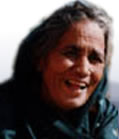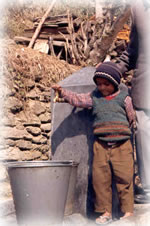 |
 |
||
 |
|||
|
RELATED THEMES agriculture development environment forestry spiritual beliefs OTHER LOCAL THEMES BACKGROUND |
water
Several describe long-established irrigation systems, and the continuing practice of appointing someone to oversee the sharing of water between farmers. "We always appoint one person to look after irrigation. He lays the kuhls (irrigation channels). His name is Kuhlvadu. He releases the water when we get to our fields. Sometimes he has quarrels with people who accuse him of giving them less and others more, but by and large he gives everybody water fairly equally. We give him enough grain through the year, or every few months, according to the size and productivity of people's fields." (India 1) Another tradition is the panta, a system of rotation: "We get water for agriculture from gadera (gully). There is panta for that and then we can sow our field. Next day it is done for the next village. There is a common saira (water source, a tank) for four to five villages. The water supply is just enough for us." (India 13) Drinking water is also discussed; some are still without pipe connections and collecting household supplies is often extremely time-consuming. A significant number compare tap water unfavourably with spring water, in terms of both flavour and health-giving properties: "There was something special in that [spring] water. There was a strength because it was from plants. It was fresh and pure water. This [tap] water, one doesn't know how it is, whether stagnant water comes [into the supply]. Chemicals are being put into it.We used to get strength from our spring water.equal to the strength from ghee today. People of today are hollow. They don't have strength." (India 6) Again, there is disillusionment and dissatisfaction with water authorities: ".there is no water even for drinking. We have been paying Rs2 as tax to the government and now it is Rs5 for the last two months but there is not a drop of water." (India 14) These interviews indicate a strong degree of concern over water supplies, and the threats posed to watersheds by continued deforestation. In particular the change from mixed deciduous forests to predominantly pine is seen as leading to the drying up of woodland springs and acidification of the soil. The number of sacred springs and rivers bear witness to people's understanding of their importance, although more than one narrator says it is the plains people who benefit most from the big rivers, which tend to bring floods to the mountains. Similarly they say, the waters of the Tehri dam will benefit city dwellers and factory owners in the lowlands rather than local people, many of whom continue to lack electricity or secure water supplies. quotes about water"We do have some water, a small reservoir - a natural spring. But it has very little water. There is a long queue of people [and they] take their turn for filling their vessels. Those people who have children staying with them can fill water during the day and the rest do so after getting back from the fields in the evening. For washing clothes we go to the river Yamuna (2.5 km away)." "Earlier we had to fetch water from a distance of two km but now there are water connections in every village and each house." "Only 15% forest remains here. [deforestation] began with the construction of the roads and the advent of development.forests give fresh air, water and many other necessary things to us. Now the people are facing the problems of drought, scarcity of water and environmental pollution." "There was and still is a ghul (canal) for irrigation and its water is distributed through panta (taking turns). by different villages.the water would go to this village until this time, and then to the next. We have our own spring for drinking water in the village." "Our fields are cultivated only on faith in God. We have harvest if it rains, otherwise not. If it does not rain for a long time then we worship our local deities and compel them to bring us rain. The entire village gathers in the temple.and we all pray. We all have full faith in our gods and goddesses. When worshipped like this they will send us good rainfall - and on time! Nowadays the meteorological department gives advance information regarding rain and drought. This helps us to prepare ourselves." |
|
 Anxiety over decreasing or unreliable water supplies is expressed in many testimonies. Many say that rainfall has become erratic and drought more common; the majority attribute this to deforestation. When it does rain, the reduced tree cover means that water runs off more easily, leading to soil erosion and poor replenishment of peoples' usual water sources. Many say that this is affecting livelihoods as their crops are failing. Narrators vary as to whether they farm some irrigated land; many are dependent on rainfall alone. Those with irrigation (sometimes government-installed; sometimes built as a community effort) have many complaints about the water authorities. One (India 28) tells how the traditional method was abandoned but its replacement was less effective:
Anxiety over decreasing or unreliable water supplies is expressed in many testimonies. Many say that rainfall has become erratic and drought more common; the majority attribute this to deforestation. When it does rain, the reduced tree cover means that water runs off more easily, leading to soil erosion and poor replenishment of peoples' usual water sources. Many say that this is affecting livelihoods as their crops are failing. Narrators vary as to whether they farm some irrigated land; many are dependent on rainfall alone. Those with irrigation (sometimes government-installed; sometimes built as a community effort) have many complaints about the water authorities. One (India 28) tells how the traditional method was abandoned but its replacement was less effective: